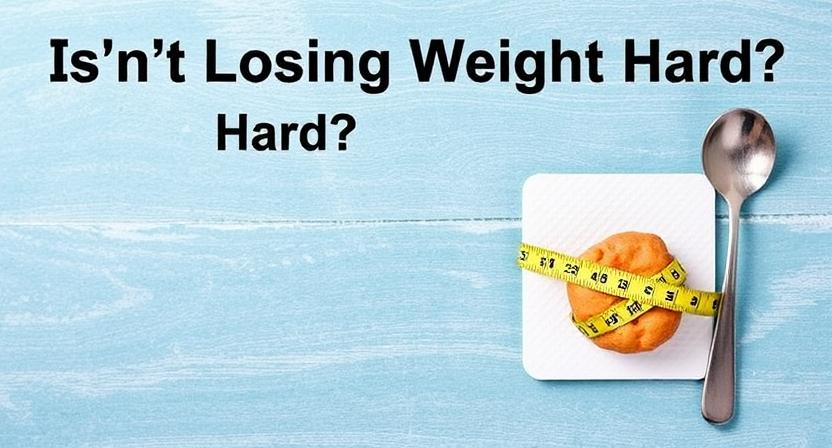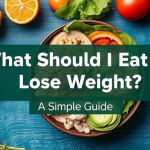Losing weight has long been seen as a difficult, frustrating, and sometimes even discouraging journey. With fad diets, conflicting advice, and the rollercoaster of motivation, it’s no wonder people often throw in the towel after a few weeks. But in 2025, things are different. Technology, science, and a better understanding of human behavior have paved the way for smarter, easier, and more sustainable weight loss.
If you’ve ever asked yourself, “Why is losing weight so hard?” — you’re not alone. But the good news is, it doesn’t have to be. In this article, we’ll break down why losing weight feels so challenging and how you can make it easier than ever in 2025.
Why Does Losing Weight Feel So Hard?
Before we dive into solutions, it’s important to understand the common reasons weight loss feels like an uphill battle:
1. Unrealistic Expectations
Many people want fast results. Social media and weight loss ads often promote dramatic transformations in weeks, which sets a false standard. When results don’t come quickly, motivation crashes.
2. Unsustainable Diets
Crash diets or extreme restrictions might give short-term results, but they’re nearly impossible to maintain. Once the diet ends, old habits return—and so does the weight.
3. Lack of Personalization
What works for your friend or favorite influencer might not work for you. Everyone’s body, metabolism, and lifestyle are different.
4. Emotional Eating
Stress, boredom, anxiety—these emotions often drive us to eat, even when we’re not hungry. Without addressing emotional triggers, diets fail again and again.
How to Make Losing Weight Easier in 2025
Thanks to modern advancements and a shift in how we approach health, it’s now easier to lose weight—without starving yourself or spending hours in the gym. Here’s how:
1. Leverage Personalized Nutrition with AI Tools
In 2025, apps and devices have become more intelligent. Nutrition tracking tools now use artificial intelligence to analyze your body type, activity level, sleep, and even genetic data to create highly personalized meal plans.
Apps like Lumen, ZOE, and MyFitnessPal AI+ can give real-time feedback on how your body responds to foods. Instead of guessing, you now know what fuels your body best.
Pro tip: Start using an AI-powered food tracker that adapts to your habits over time. It makes staying on track much easier than following a one-size-fits-all meal plan.
2. Follow the 80/20 Rule (For Real)
Forget strict dieting. The 80/20 rule has become a core approach in 2025’s weight loss trends: eat nutritious, whole foods 80% of the time, and allow yourself to enjoy treats the other 20%.
This mindset shift eliminates guilt and helps you stay consistent. When you’re not constantly saying “no” to your favorite foods, cravings become manageable and you’re more likely to stick with your plan.
3. Make Movement a Daily Habit, Not a Chore
You don’t need to kill yourself with intense workouts. Consistency is more important than intensity.
Thanks to wearable tech like smart rings and advanced fitness trackers, it’s easier than ever to track your movement and make it fun. Whether it’s walking 8,000–10,000 steps a day, doing short 10-minute HIIT sessions, or dancing around your kitchen—what matters is that you move daily.
2025 Insight: Many people are losing weight simply by staying active throughout the day and using gentle forms of exercise that they enjoy. No gym membership required.
4. Track Progress Beyond the Scale
The number on the scale doesn’t tell the whole story. In 2025, more people are focusing on body composition, not just weight.
Smart scales and apps can now measure body fat percentage, muscle mass, hydration, and even visceral fat. These metrics give a clearer picture of your progress.
Also, keep track of:
- How your clothes fit
- Energy levels
- Sleep quality
- Mood and mental clarity
By shifting your focus, you’ll feel encouraged by all the wins that the scale might miss.
5. Use Behavior Change Psychology
Willpower fades—but habits stick. New habit-forming apps like Noom 2.0, Coach.me, and Atomic Habits Tracker use psychology-based coaching to help rewire your mindset around food, motivation, and self-sabotage.
In 2025, many weight loss success stories come from people who focused on habit change instead of just calorie counting. Replacing evening snacking with tea, or starting your day with a 5-minute walk, might seem small—but those changes compound over time.
6. Prioritize Sleep and Stress Management
It’s no longer a secret: poor sleep and high stress lead to weight gain. In fact, sleep might be the most overlooked key to easier weight loss.
Modern sleep trackers like Whoop, Oura, and SleepSpace help optimize sleep cycles. Combined with mindfulness apps, stress-reducing supplements like magnesium glycinate, and breathing exercises, people are finally realizing how vital rest is for fat loss.
7. Support and Accountability Matter More Than Ever
Even with all the tech, having someone in your corner makes a huge difference. In 2025, virtual coaching, community-based challenges, and accountability partners are more accessible than ever.
Online groups (through apps like Reddit, Fitbit communities, or even TikTok challenges) give daily encouragement and tips. Some AI health apps even offer chatbot support and virtual coaching for motivation on the go.
8. Ditch “All or Nothing” Thinking
One bad meal doesn’t ruin your progress. One missed workout doesn’t mean starting over. In 2025, the most successful people understand that progress, not perfection, leads to long-term results.
The new weight loss mindset is about course correction, not punishment. When you treat slip-ups as learning experiences instead of failures, you stay in the game—and win in the long run.
Final Thoughts: Weight Loss Can Be Easier in 2025
Yes, losing weight has been hard—but it doesn’t have to stay that way. In 2025, we have tools, knowledge, and support systems that make the journey smoother, smarter, and more sustainable.
The secret isn’t in a magic pill or a restrictive diet. It’s in small, consistent changes, personalized strategies, and a mindset focused on self-compassion, not punishment.
So if you’re ready to lose weight this year, start simple. Walk daily, eat whole foods most of the time, get good sleep, and track your progress. And above all—be patient with yourself. You’ve got this.






Leave a Reply